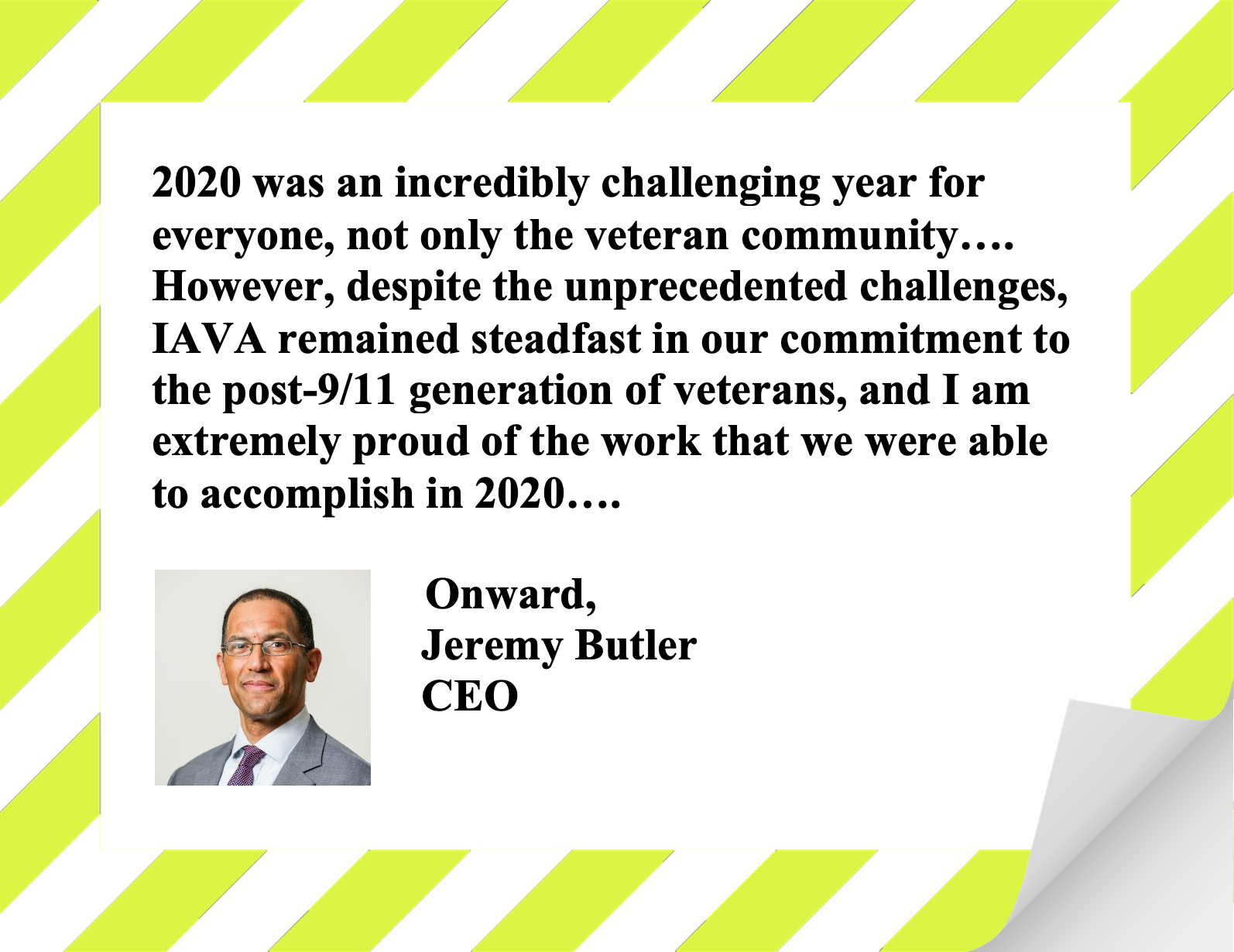IAVA's Policy Agenda for the 117th Congress
Minority and Underserved Veterans
Minority and Underserved Veterans
Since IAVA’s inception, IAVA has fought for equality and diversity in the armed services. It is our foundational belief that diversity is a force multiplier for our armed forces and our nation. We have a long history of fighting for equality and standing up for religious and racial minorities. We consistently speak out against racism and discrimination and were the first mainstream veteran organization to speak out in the aftermath of the killing of George Floyd.
Research shows that Black veterans face racial biases in mental health care settings, which is a concern of potentially devastating proportions. A recent survey conducted among VA employees revealed troubling findings of unchecked racism and harassment towards minorities. VA leadership needs to make fighting bigotry in all forms a top priority in order to rectify the widespread discrimination and promote inclusivity. VA must also ensure that the needs of older Black veterans, many of whom gave up on VA due to these issues long ago, are both fully understood, and also addressed. We must ensure that Black veterans receive the care that their service deserves.
IAVA led the veteran community in supporting the repeal of “Don’t Ask, Don’t Tell” (DADT) and endorsed the repeal of the Defense of Marriage Act (DOMA). In 2016, IAVA firmly supported the announcement by DoD to allow transgender troops to serve openly without threat of discharge. We fought against the previous Administrations attempt to force transgendered troops from out of the military. IAVA was proud to see the new Administration overturn that decision within the first 10 days in office. We will continue to fight to ensure that no harmful policies such as this can be enacted again.
American Indian and Alaska Natives (AI/AN) have a long history of distinguished U.S. military service. They serve at a higher rate per capita than any other cohort of Americans and have served in all the nation’s wars since the Revolutionary War, and in several wars before they were even recognized as citizens. Despite their service, AI/AN veterans have lower incomes, higher unemployment rates, and are more likely to lack health insurance than other veterans.
The United States must honor its commitments to AI/AN veterans. The federal government’s responsibility to provide quality healthcare and other benefits to AI/AN veterans comes both from their military service and the federal government’s treaty and trust obligations to Tribes.
IAVA's Recommendations
- Allow all qualified persons to be recruited and serve in the armed forces who are able to meet DoD standards of fitness
- Fully recognize same-sex marriage of all veterans, where the veteran or the veteran’s spouse resides anywhere in the United States or its territories at the time of the marriage or at the time of application for benefits. Repeal section 103c of Title 38. (aka “mini-DOMA”)
- Support and fund veteran support programs specifically dedicated to minority servicemembers, veterans and their families
- Launch an organized, systematic education and outreach campaign for LGBTQ+ veterans informing them about benefits and services that may now be available to them and their families
- Reach out to veterans who were discharged pursuant to DADT and offer assistance in updating and/or upgrading discharge paperwork
- Continue to empower LGBT Veteran Care Coordinators in each VA medical facility to support and encourage LGBTQ+ veterans to navigate the benefits and health care process
- Require status of force agreements (SOFA) to include parity for same-sex military spouses and establish a policy to prevent inadvertent career detriments to LGBTQ+ troops who may be unable to consider certain foreign assignments due to SOFAs
- Empower the Center for Women Veterans (CWV) and the Center for Minority Veterans (CMV) to review and recommend changes to VA public communication
- Ensure that all VA facilities are free from racism, bigotry, harassment, and retaliation and inclusive to all patients and employees
- Ensure American Indian and Alaskan Native (AI/AN) cultural competence at the VA to help address deficiencies in quality of healthcare and accessibility of services
- VA needs to collect AI/AN suicide data to better address the tribal crisis. VA continues to omit this data
- To address AI/AN homelessness, make permanent the VA-supported Tribal housing program within the larger HUD VASH program and make sure the program has adequate funding
- Fully implement the VA Affairs Tribal Advisory Committee Act passed in 2020 to establish an Advisory Committee on Tribal and Indian Affairs, which will add a perspective from Native veterans with a direct connection to the VA Secretary
- Fully implement the Native American Veteran Parity in Access to Care Today (PACT) Act passed in 2020 to eliminate VA copays for Native veterans, creating parity with the care they receive through the Indian Health Service
- Rename DoD and VA installations named after Confederate soldiers
- Require VA to both study the need and assist the aging Black veteran population by ensuring that their disability ratings fully reflect their service-connected disabilities
- Fully implement the GI Bill Repair Act to repair inequalities that Black World War II veterans faced when accessing GI Bill benefits
IAVA's Policy Priorities
Select a topic from the list below to learn about IAVA’s policy recommendations for the 117th Congress.

